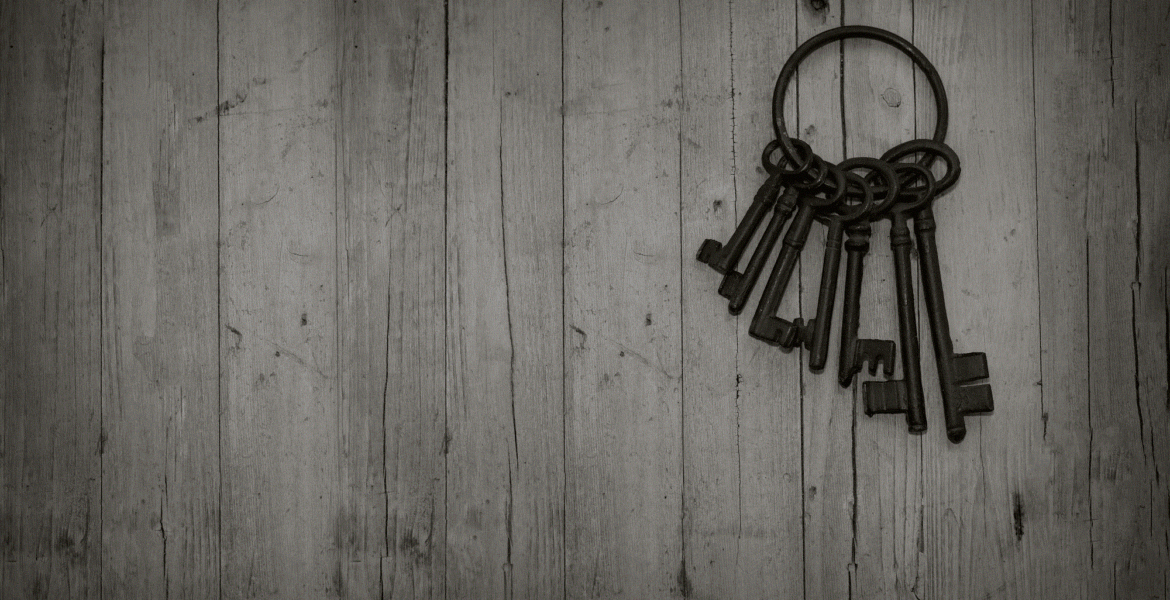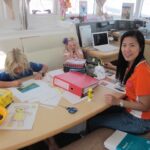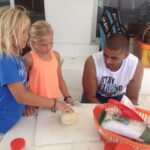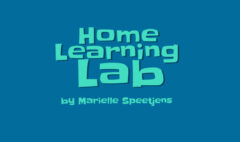Key Secrets to Successful Home Learning
It should be no secret that Home Schooling requires extensive preparation, especially if you are new to it and/or have more than one child to attend to.
However, after having home schooled my children on a boat for seven years, I also know that preparation alone will not guarantee success or make you feel “you accomplished something” and/or “have kept your sanity” at the end of the day. So much boils down to your mindset.
To help you and your kids have the best possible Home Learning experience, I’m excited to share my key secrets with you. So, make yourself comfortable and have a read.
01
Have Faith in Yourself & Your Kids
Parents are terrified of failing their children and I’m no exception.
It took me some time to establish confidence on the home learning front but once I got it, there was no turning back. Remember that as the parent you know your children better than anybody else and you will strive to do whatever is best for them, whatever it takes. You’ve got this and your kids will be more than fine!

TIP:
Make sure you take at least 10 minutes for yourself every morning to PRIME yourself for the day ahead. It helps to stay focused, patient and calm (at least most of the time 😉 and make the best of your day.
02
Have Fun (Part I)
Connecting with your kids is crucial and what better way to do it than to have fun together. Acting silly and playing (educational) games is a wonderful way to connect, have fun and learn at the same time. Play is a vital element of home learning, especially (but not only) for younger children. Take a look at the videos below to see how music played an important role to connect, have fun and learn during our home learning days.
VIDEOS:

Rock and Roll Breakfast
03
Set Realistic Expectations
Accept that it can get ugly sometimes. Whether you have an off day, are per-occupied with something else or one of your kids throws a tantrum, isn´t listening or starts a fight with his siblings, it´s part of life and it will be part of your home learning experience as well. Treat these situations as life lessons in themselves.

04
Establish a “Flexible Routine”
Parents are terrified of failing their children and I’m no exception.
It took me some time to establish confidence on the home learning front but once I got it, there was no turning back. Remember that as the parent you know your children better than anybody else and you will strive to do whatever is best for them, whatever it takes. You’ve got this and your kids will be more than fine!
EXAMPLE
Our routine consisted of a daily time schedule (see below), but nothing was set in stone. If our kids got an opportunity to learn how to clean fish with the fisherman in the Marina, we would adjust our plan for the morning. When, very rarely, it would rain, we would go outside and jump in the puddles. If the aircon on the boat broke down during a hot day, we would go on an indoors, airconditioned fieldtrip. We spent long summers in Europe to escape the heat in Dubai and traveled mostly outside regular school holidays to avoid crowds and queuing. “School” always accompanied us wherever we would go.
| 8.00AM | Wake up |
| 8.30AM | Sports |
| 9.30AM | Breakfast |
| 10.00AM | Start School |
| 1.00PM | Lunch |
| 2.00PM | Continue School |
| 4.30PM | After School Act. |
| 7.00PM | Diner |
| 8.30PM | Bedtime |
05
Less is More & Keep it Simple
This has become my mantra while living on a boat for eleven years. Basic school supplies and household items will get you far (watch the videos below where Gina and Nicholas prove that air takes up space). You don´t need a whole lot of space to make it work either. To get an idea on our Home Learning Life on a Boat, check out the slideshow “Joey´s Kingdom”.
Prioritize your children’s greatest need and their biggest interest or passion and they will love to learn. Be creative, start small, keep it simple and enjoy the ride.
VIDEOS:
Nicholas Proving That Air Takes Space
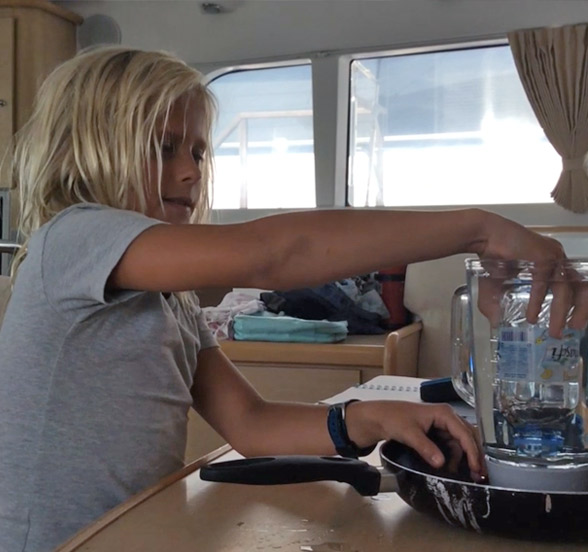
Gina Proving That Air Takes Space
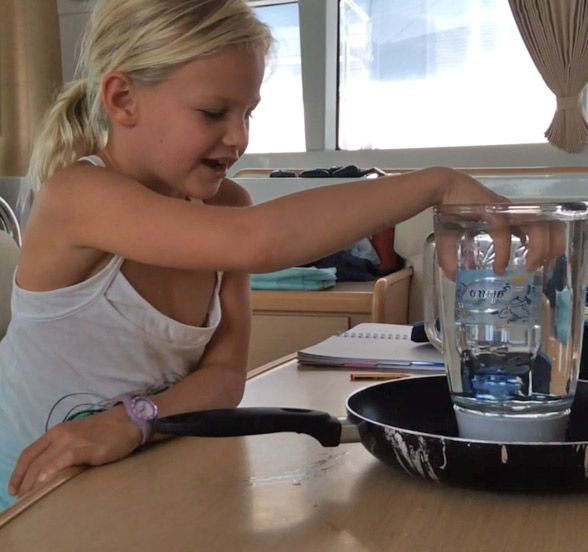
06
Never Let Perfect be the Enemy of Good
Real life isn´t perfect and home schooling isn´t either. In striving to do what is best for your child, you will be confronted with a lot of choices. What is the best method, curriculum, lesson plan, home room set up, structure, resources, tools, activities etc? Take your time to make those choices, experiment for a while (use your home as a lab) before you commit to expensive (online) programmes and know that you’ll learn as you go. Give yourself permission to fail. Trust me: You will fail at something along the way. It is only when the pressure of perfection has been removed that you can tap into your inner genius and do your best work.
BENEFITS:
- Helps reducing your stress levels;
- Helps getting to know your child’s learning style;
- Helps determining how to set up your home learning room;
- Helps deciding on resources and tools that work for you;
- Helps saving money (by only spending it on resources that work for you);
- All the above will save you time in the long run.
07
Have Fun (Part II)
Did you know that there´s a whole home schooling community out there that call themselves gameschoolers and believe that homeschooling can be (almost) all fun and games. Check out my list of Preferred Online Resources for more information.

08
Books, Books, Books!
There are books on just about everything. Use them! If you don´t feel like Math on a Monday morning, read This Book Thinks You´re a Math Genius, by Mike Goldsmith, a creative approach to math with lots of activities that make it fun and accessible for children. There are even Adventure books that deal with Math Subjects in a fun way. If you don´t even feel like reading a book or get stuck for whatever reason, listen to an audio book together. The options are limitless and stories just provide a beautiful way to engage and learn together.
So, this is my advice:
- Read lots of books aloud together.
- Listen to lots of audiobooks together.
- Watch movies based on a books and compare/contrast together.
- Act out a book together.
09
Screens do not kill Brains
There are amazing online resources out there. The amount of (free) online resources can be overwhelming though. My advice is to find a few resources that work for you and build from there. If you agree with me that screens do not kill brains, check out my list of Preferred Online Resources. My kids just loved them, as they considered them fun and allowed them to work independently. This created an opportunity for me to work individually with one child on subjects that needed more guidance. A welcome win-win situation!
VIDEOS:
Adding in Fives
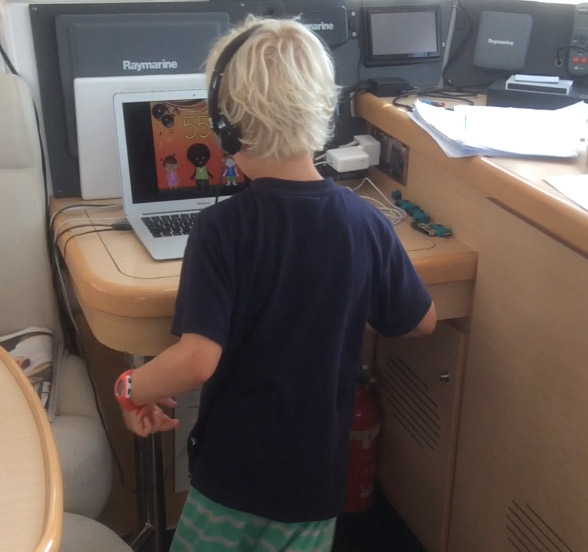
10
Keep a Healthy Lifestyle
I´m a strong advocate of “Sleep Well, Eat Healthy and Be Physically Active”. I´m convinced it will create the best version of your kids and yourself. Your mood, energy levels, memory and brain health will improve. This isn´t a secret at all, yet it is often overlooked when you are busy, stressed, pressured for time or just too tired. Making a healthy lifestyle for yourself and your children a priority will definitely help you to stay on top of your home learning plan and will establish a strong foundation for your children’s future.

Rust, Reinheid, Regelmaat
11
Create a Support Group
Where possible, involve family and friends in your children’s home learning. They may be able to help with certain subjects or issues you encounter. As we had no family around, I identified friends as mentors. Most of them happened to be coaches (we are a sporty family 🙂 ). As the kids would spend several hours a week with them, they knew my children well, I trusted them and the kids looked up to them. It can be hard being a mom and a teacher (I’m not even mentioning all the other hats moms are wearing) and it makes a big difference if you can delegate or share some tasks once in a while.
Joey’s Reading Session with Papa
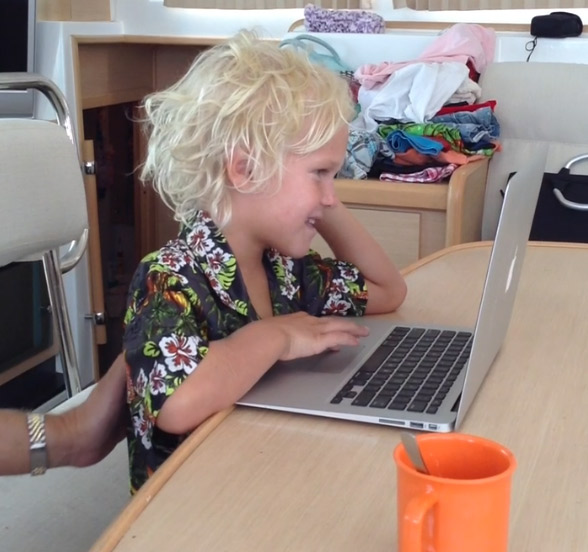
12
Have Fun Part (III)
Don´t forget to have fun 🙂 !
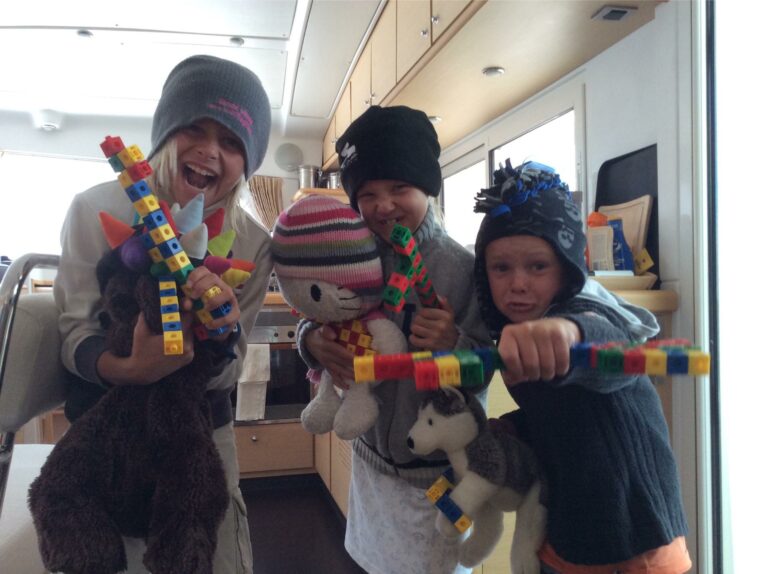


13
Stay True to Yourself
The grass might seem greener on the other side but don´t forget that it might be fake grass.
Stay true to yourself, don´t compare yourself to others. Your situation, outlook on life, objectives and mindset are probably different and so are your kids. Find your own path. You don´t need to re-create school at home either. You have the power to do things differently. You'll be defining, and constantly redefining, yourself and your journey as you go and if it doesn’t work, change it!



